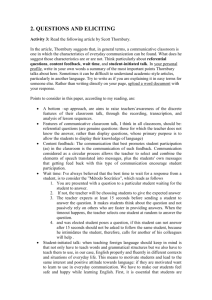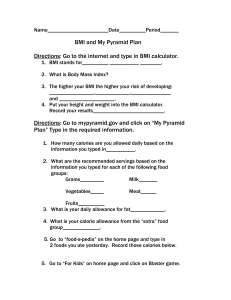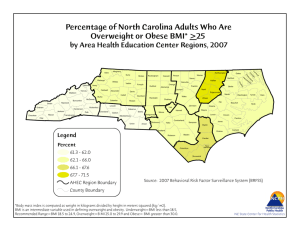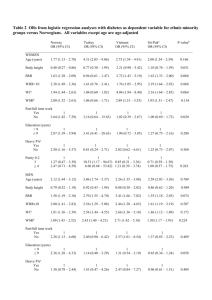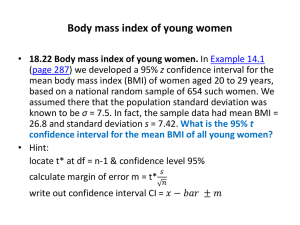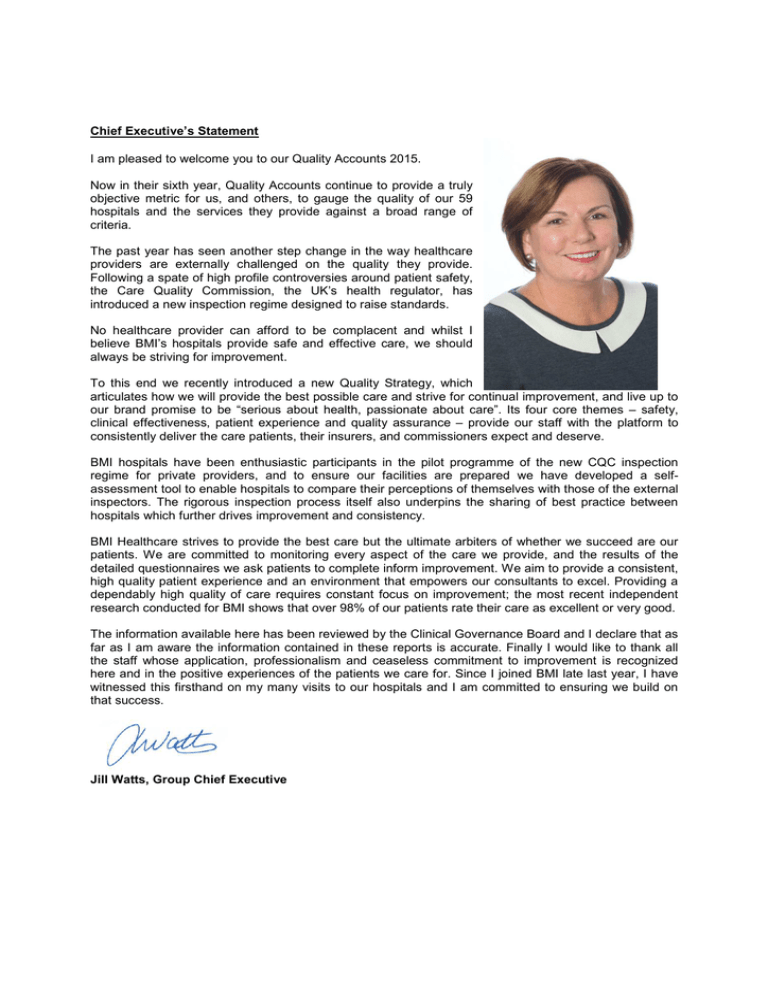
Chief Executive’s Statement
I am pleased to welcome you to our Quality Accounts 2015.
Now in their sixth year, Quality Accounts continue to provide a truly
objective metric for us, and others, to gauge the quality of our 59
hospitals and the services they provide against a broad range of
criteria.
The past year has seen another step change in the way healthcare
providers are externally challenged on the quality they provide.
Following a spate of high profile controversies around patient safety,
the Care Quality Commission, the UK’s health regulator, has
introduced a new inspection regime designed to raise standards.
No healthcare provider can afford to be complacent and whilst I
believe BMI’s hospitals provide safe and effective care, we should
always be striving for improvement.
To this end we recently introduced a new Quality Strategy, which
articulates how we will provide the best possible care and strive for continual improvement, and live up to
our brand promise to be “serious about health, passionate about care”. Its four core themes – safety,
clinical effectiveness, patient experience and quality assurance – provide our staff with the platform to
consistently deliver the care patients, their insurers, and commissioners expect and deserve.
BMI hospitals have been enthusiastic participants in the pilot programme of the new CQC inspection
regime for private providers, and to ensure our facilities are prepared we have developed a selfassessment tool to enable hospitals to compare their perceptions of themselves with those of the external
inspectors. The rigorous inspection process itself also underpins the sharing of best practice between
hospitals which further drives improvement and consistency.
BMI Healthcare strives to provide the best care but the ultimate arbiters of whether we succeed are our
patients. We are committed to monitoring every aspect of the care we provide, and the results of the
detailed questionnaires we ask patients to complete inform improvement. We aim to provide a consistent,
high quality patient experience and an environment that empowers our consultants to excel. Providing a
dependably high quality of care requires constant focus on improvement; the most recent independent
research conducted for BMI shows that over 98% of our patients rate their care as excellent or very good.
The information available here has been reviewed by the Clinical Governance Board and I declare that as
far as I am aware the information contained in these reports is accurate. Finally I would like to thank all
the staff whose application, professionalism and ceaseless commitment to improvement is recognized
here and in the positive experiences of the patients we care for. Since I joined BMI late last year, I have
witnessed this firsthand on my many visits to our hospitals and I am committed to ensuring we build on
that success.
Jill Watts, Group Chief Executive
BMI Thornbury Hospital
BMI Thornbury Hospital has 72 beds and cares for adults and children undergoing a wide range
of surgical procedures and those requiring other medical interventions. We have a dedicated
Cancer Unit offering both chemotherapy and supportive therapies to patients. We have a full
range of Diagnostic Imaging Services including one of six Gamma Knives in the UK. Other
imaging facilities include a 161 slice CT scanner with a cardiac package and a new MR scanner
with breast coil package. BMI Thornbury Hospital offers a Level Two Plus Critical Care facility
for those patients requiring additional monitoring and support. A list of other services include
Health Screening, Private Gp service, Fertility as a joint venture with the Jessops Wing,
Gynaecology, Ophthalmology, Bariatric Surgery, Cosmetic Surgery, Endoscopy and
Orthopaedics. BMI Thornbury Hospital has over 250 Consultants with practicing privileges
across a number of specialties who operate within the hospital utilising both the inpatient and
outpatient facilities. BMI Thornbury Hospital offers a limited service for children but works well
with the Sheffield Children’s Hospital to ensure that the correct clinical pathway can be
achieved.
The hospital has received capital funding for a brand new Endoscopy stack which will be
available for use by the end of July and for a number of years the hospital has had problems
with the patient lift, this is now in the process of being replaced and again will be fully installed
by the middle of July.
The hospital works very closely with a number of local NHS Trusts and 63% of BMI Thornbury
Hospitals current caseload is supporting and treating NHS patients.
In order to support the increased volume of NHS patients and to ensure that we are working in a
more efficient way, we have created two “walk in walk out” rooms with 9 reclining chairs to
accommodate appropriate day case procedures ie cataracts.
BMI Thornbury Hospital works in a transparent way with its key stakeholders and can
demonstrate a good working relationship with them.
The hospital has a robust Clinical Governance structure to ensure that patient safety is at the
forefront of everything we do. This links in with both the company governance strategy and
governmental agendas and we have full engagement from the Medical Advisory Committee.
BMI Thornbury Hospital has a local framework through which clinical effectiveness, clinical
incidents and clinical quality is monitored and analysed. Where appropriate, action is taken to
continuously improve the quality of care. This is through the work of a multidisciplinary group
and the Medical Advisory Committee.
Regional Clinical Quality Assurance Groups monitor and analyse trends and ensure that the
quality improvements are operationalised. 2014/15 saw a 93% achievement of our CQUIN
measures including the Friends and Family Test, Safety Thermometer, 15 Steps. The Early
Mobilisation of Hip and Knee patients was partially achieved. Whilst not a CQUIN for this year
the hospital continued to audit VTE and WHO compliance and achieved an overall average of
97% compliance for VTE and 98% compliance for WHO.
At corporate level the Clinical Governance Board has an overview and provides the strategic
leadership for corporate learning and quality improvement.
At present we provide full, standardised information to the NHS, including coding of procedures,
diagnoses, co-morbidities and PROMs for NHS patients.There are additional external reporting
requirements for CQC, Public Health England (Previously HPA) CCGs and Insurers.
BMI Healthcare are registered as a provider with the Care Quality Commission (CQC) under the
Health & Social Care Act 2008. BMI Thornbury Hospital is registered as a location for the
following regulated services:•
•
•
Treatment of disease, disorder and injury
Surgical procedures
Diagnostic and screening
Family Planning
The CQC carried out an unannounced inspection on the 9th December 2013 and found the
following:
These are the results of our most recent checks showing whether this care service is meeting
each of the standards that the government says you have the right to expect. These outcomes
were the 5 chosen to be audited at the last inspection.
1 Treating people with respect and involving them in their care
Overall
2 Providing care, treatment and support that meets people's needs
Overall
3 Caring for people safely and protecting them from harm
Overall
4 Staffing
Overall
5 Quality and suitability of management
Overall
To date we have not received notification of another CQC inspection.
There has been ongoing focus on robust reporting of all incidents, near misses and outcomes.
Data quality has been improved by ongoing training and database improvements. New reporting
modules have increased the speed at which reports are available and the range of fields for
analysis. This ensures the availability of information for effective clinical governance with
implementation of appropriate actions to prevent recurrences in order to improve quality and
safety for patients, visitors and staff.
BMI is a founding member of the Private Healthcare Information Network (PHIN) UK – where
we produce a data set of all patient episodes approaching HES-equivalency and submit this to
PHIN for publication. The data is made available to common standards for inclusion in
comparative metrics, and is published on the PHIN website http://www.phin.org.uk. This website
gives patients information to help them choose or find out more about an independent hospital
including the ability to search by location and procedure.
1. Safety
1.1 Infection prevention and control
The focus on infection prevention and control continues under the leadership of the Group Head
of Infection Prevention and Control, in liaison with the link nurse in BMI Thornbury Hospital.
In 2014/15 We have had: • 0 MRSA bacteraemia cases/100,000 bed days
• 1 MSSA bacteraemia cases /100,000 bed days
• 0 E.coli bacteraemia cases/ 100,000 bed days
• 1 hospital apportioned Clostridium difficile in the last 12
months which was antibiotic induced.
• SSI data is also collected and submitted to Public Health
England for Orthopaedic surgical procedures. Our
rates of infection are as follows:
o Hips - 2
o Knees - 2
Departmental audits are carried out by the infection control lead on a regular basis,
using the guidance from the Infection prevention Society’s Quality Improvement tools.
2014 – 2015, saw 9 departments audited, with the majority scoring 92% or above.
Those departments scoring below the acceptable 90% mark were re audited within 6
weeks, and vast improvement was seen following deep cleaning and general
maintenance work. There is a continuous decorating programme in place. A number of
areas have already been addressed whereby there has been new flooring, seating and
decoration in those areas.
A new cleaning system led by Vileda has been trialed within the company and has now
been rolled out across the hospital.
High impact intervention Care bundles continue to be audited on a regular basis and cover the
insertion of and care of peripheral lines, insertion and care of central lines, insertion and care of
urinary catheters, pre op care and post op care. These are audited on a monthly basis by the
infection control lead and departmental staff. 100% compliance is seen in all care bundles with
the exception of peripheral lines. There continues to be improvement with this and following
education and training a score of above 83% has been achieved. The main issue relates to
insertion documentation as opposed to reported complications with the peripheral line.
Hand hygiene remains a real focus within the hospital and regular audits for both clinical and
non- clinical staff are carried out. We have seen good compliance from the non -clinical teams
with scores starting at 92% and now achieving 100%. There was an issue with clinical teams
not fully adhering to “bare below the elbow” policy. Therefore one audit scored 55% but more
recent audits have achieved over 95% compliance.
ANTT (Asceptic Non Touch technique) has been rolled out across the hospital and is regularly
monitored for compliance.
BMI Thornbury Hospital was fully compliant with the CBE (Carbapenese) screening
requirements with alert systems in place. Staff were made aware of the need to be vigilant and
proactive in managing the Ebola risk even though very small but a risk assessment was devised
and implemented.
Environmental cleanliness is an important factor in infection prevention and our patients rate the
cleanliness of our facilities as good. The graph below shows an average rating over the past
year.
Overall Cleanliness
1.2 Patient Led Assessment of the Care Environment (PLACE)
We believe a patient should be cared for with compassion and dignity in a clean, safe environment.
Where standards fall short, they should be able to draw it to the attention of managers and hold the
service to account. PLACE assessments will provide motivation for improvement by providing a clear
message, directly from patients, about how the environment or services might be enhanced.
The assessments involve patients and staff who assess the hospital and how the environment
supports patient’s privacy and dignity, food, cleanliness and general building maintenance. It focuses
entirely on the care environment and does not cover clinical care provision or how well staff are
doing their job.
The results will show how hospitals are performing nationally and locally. Unfortunately the results
for 2014/2015 not available at the time of this report. 2014/2015 PLACE audit occurred on the 15th
May and were submitted on the 22nd May 2015 as required.
2013/2014 PLACE assessment was a positive experience with good feedback including a sense that
the environment supported good patient care and was safe. Whilst we did not receive any negative
comments, the audit did suggest that the hospital signage needs to be improved and we should be
mindful of the patient demographics within Sheffield as all of our signage is in English.
1.3 Venous Thrombo-embolism (VTE)
BMI Healthcare, holds VTE Exemplar Centre status by the Department of Health across its
whole network of hospitals including, Thornbury.
BMI Healthcare was awarded the Best VTE Education Initiative Award category by Lifeblood in
February 2013 and have maintained accreditation in 2014/ 2015.
We see this as an important initiative to further assure patient safety and care. We audit our
compliance with our requirement to VTE risk assessment every patient who is admitted to our
facility and the results of our audit on this has shown 100% compliant for the last quarter with an
average of 97% for the year. This continues to be audited on a monthly basis but the risk
assessments are checked daily as part of the drug rounds. All patients are given prophylaxis if
deemed clinically appropriate. This ranges from injectable medication and / or TED support
stockings.
BMI Thornbury Hospital reports the incidence of Venous Thromboembolism (VTE) through the
corporate clinical incident system. It is acknowledged that the challenge is receiving information
for patients who may return to their GPs or other hospitals for diagnosis and/or treatment of VTE
post discharge from the Hospital. As such we may not be made aware of them. We continue to
work with our Consultants and referrers in order to ensure that we have as much data as
possible. In order to try and capture any possible DVTs following discharge we have
implemented the 48 hour follow up call and all hip and knee patients are part of the 30 day SSI
audits.
BMI Thornbury Hospital saw 2 patients with DVT’s following surgery, both patients had the full
risk assessment & appropriate prophylaxis was administered as per protocol. Both patients
were mobilised initially within 12 hours of surgery as part of the enhanced recovery programme.
2. Effectiveness
2.1 Patient reported Outcomes (PROMS)
Patient Reported Outcome Measures (PROMs) are a means of collecting information on the
effectiveness of care delivered to NHS patients as perceived by the patients themselves.
PROMs is a Department of Health led programme.
Latest results can be found by going on the online SOLAR system provided to you by Quality
Health.
For the current reporting period, BMI Thornbury Hospital holds insufficient data to show a
comparison with the national average.
April 14 – September 14
Thornbury
England
Oxford Hip Score average
Health gain between reporting
Q1
Q2
periods
No
sufficient
data
available
No
sufficient
data
available
18.16
40.081
21.922
Copyright © 2013, The Health and Social Care Information Centre. All Rights Reserved.
April 14 – September 14
Oxford Knee Score average
Health gain between reporting
Q1
Q2
periods
Thornbury
No
sufficient
data
available
No
sufficient
data
available
England
19.401
36.103
16.702
Copyright © 2013, The Health and Social Care Information Centre. All Rights Reserved.
2.2 Enhanced Recovery Programme (ERP)
The ERP is about improving patient outcomes and speeding up a patient’s recovery after
surgery. ERP focuses on making sure patients are active participants in their own recovery and
always receive evidence based care at the right time. It is often referred to as rapid recovery, is
a new, evidence-based model of care that creates fitter patients who recover faster from major
surgery. It is the modern way for treating patients where day surgery is not appropriate.
ERP is based on the following principles:1. All Patients are on a pathway of care
a. Following best practice models of evidenced based care
b. Reduced length of stay
2. Patient Preparation
a. Pre Admission assessment undertaken
b. Group Education sessions
c. Optimizing the patient prior to admission – i.e HB optimisation, control comorbidities, medication assessment – stopping medication plan.
d. Commencement of discharge planning
3. Proactive patient management
a. Maintaining good pre-operative hydration
b. Minimising the risk of post-operative nausea and vomiting
c. Maintaining normothermia pre and post operatively
d. Early mobilisation
4. Encouraging patients to have an active role in their recovery
a. Participate in the decision making process prior to surgery
b. Education of patient and family
c. Setting own goals daily
d. Participate in their discharge planning
BMI Thornbury Hospital has an average length of stay of 2.6 days for hip surgery and 3.2 days
for knee surgery. This is largely due to a very proactive pre assessment and physiotherapy
team who ensure that the patients are given accurate information prior to admission regarding
their expected length of stay. This has been further supported by the marketing team who have
liaised with GPs to ensure that they give the patients realistic time frames in order to set the
expectation at the beginning of the pathway.
It is imperative that patients are in optimal condition prior to their surgery and therefore patients
are fully assessed with a key focus on certain aspects ie BMI – do they need to lose weight prior
to their surgery, nutritional status – do they need carbohydrate preloading prior to surgery,
haemodynamically stable – do they need their electrolytes correcting prior to surgery or a blood
transfusion. All of these are considered before a patient is operated on.
Pain management is a key part in a patient’s recovery and ensuring that patients have a realistic
expectation of this is essential. All patients are assessed and given the appropriate analgesia to
enable them to mobilise at the earliest and clinically appropriate opportunity.
A physiotherapist sees the patient on admission to ensure that they understand what will
happen to them post -surgery. Most patients are then stood within 12 hours of their surgery and
are properly mobilising by 24 hours. This reduces their risk of post -operative complications
specifically venous thromboembolism.
BMI Thornbury Hospital has just established group pre-operative physiotherapy classes that are
offered to all hip and knee patients at pre assessment to further improve their recovery and give
the patient and their families the opportunity to be active participants in this.
2.3 Unplanned Readmissions within 30 days and unplanned returns to theatre.
Unplanned readmissions and unplanned returns to theatre are normally due to a clinical
complication related to the original surgery.
Given the number of procedures that BMI Thornbury Hospital conducts in year, on average
8,500 we saw 16 returns to theatre for clinical complications that were a known risk associated
with the surgical procedure. There were no trends identified. There were no Never Events or
Serious Untoward Incidents at the hospital in this period.
3. Patient experience
3.1 Patient satisfaction
BMI Healthcare is committed to providing the highest levels of quality of care to all of our
patients. We continually monitor how we are performing by asking patients to complete a patient
satisfaction questionnaire. Patient satisfaction surveys are administered by an independent third
party.
BMI Thornbury Hospital Patient Satisfaction Dashboard - April 2014 – March 2015
Top 5 Most Improved Satisfaction Scores
Question
Assistance with Planning Your Departure
Instructions of Your Aftercare
Convenience of your Departure Time
Information Pack Received from the Hospital
Overall Rating of Quality of Care
March 2014
86.1%
90%
88.4%
94.1%
95.7%
Increase
5.4%
4.4%
3.6%
2.8%
2.3%
March 2015
91.5%
94.3%
92%
96.9%
98%
Response Rates
Overall response rates for questionnaire completion & return is 10.4% for the in-patient form and 18.1% for the
shortened form. Encouraging patients to provide us with feedback following care is an on-going challenge & low
response rates could impact on the information gained.
Statement from NHS Sheffield Clinical Commissioning Group
For a number of years NHS Sheffield Clinical Commissioning Group (CCG) has had contact with BMI
Thornbury Hospital in relation to the provision of NHS elective care, managed under the conditions of
the NHS Standard Contract. This has been and continues to be a very positive business relationship
where we have been able to constructively discuss any issues that have arisen and practically resolve in
a timely manner.
The Director of Clinical Services has provided the clinical support to the contract and again has worked
in a very positive way to respond to clinical issues according to the contract requirements.
NHS Sheffield CCG has had the opportunity to review and comment on the information in this quality
account prior to publication. BMI Thornbury Hospital has considered our comments and made
amendments where appropriate. To the best of our knowledge the information supplied within this
account is factually accurate and a true record for the period April 2014 – March 2015.
The CCG is encouraged that BMI Thornbury Hospital continues to focus on providing an excellent quality
of service to all of its patients.
Low scores within accommodation reflect & we acknowledged that investment in the actual
building is required as it does look tired. Over the past year we have replaced flooring in a
number of areas, removed the curtains and replaced with blinds, replaced some seating,
redecorated many of the rooms and an ongoing decoration programme is in place. Other plans
include installing a wet room on Mappin Ward.
3.2 Complaints
In addition to providing all patients with an opportunity to complete a satisfaction survey BMI
Hospital actively encourages feedback both informally and formally. Patients are supported
through a robust complaints procedure, operated over three stages:
Stage 1: Hospital resolution
Stage 2: Corporate resolution
Stage 3: Patients can refer their complaint to independent adjudication if they are not satisfied
with the outcome at the other 2 stages.
Total
non
clinical
April
- 14
11
May- Jun
14 -14
15 9
6
12
6
Jul14
17
Aug14
10
Sep14
11
Oct14
11
16
8
8
5
Nov- Dec14
14
8 12
5
3
Jan15
10
Feb15
8
Mar15
14
5
3
7
Total Number of Complaints recieved = 136 of which 84 were non clinical and 52 were
clinical. None of these were escalated to stage two as they were resolved at site.
The common theme for non-clinical complaints related to finance, patients felt that they
sometimes received an unexpected invoice. In addition to this some patients were confused
and did not understand that the consultant fees were separate to the hospital fees and in
addition to these there were multiple charges for ie routine blood tests. The hospital has reacted
to this and there is now more information available to inform patients that they will incur charges
for every test that they have.
A common theme for the clinical complaints received initially related to patients feeling that
some of the staff were not as engaging or as informative as they should have been and in some
cases poor attitude was cited. This has improved with staff attending further customer services
training and issues are addressed with individuals. However, some patients feel that
communication could be improved upon and this relates to being informed of their expected
theatre time and anticipated discharge time. Patients report on occasion that they feel that they
are not kept informed if there is a change to the list or a delay to their planned operating time.
This is something that the hospital is addressing.
CQUIN
There were a number of CQUIN agreed between the CCG and BMI Thornbury Hospital
for 2014/2015.
•
•
•
•
These were as follows:
Friends and Family test – This looks at whether or not you would recommend your
friends and family to this facility. This was achieved
15 Steps – this looks at the first “15 steps” into the care environment to ascertain a
number of things including: Do you feel welcomed? Is it safe? Do you feel cared for and
involved in your care? Is it well organized and calm? This was achieved
Early Mobilisation – This looked at the early mobilization of hip and knee patients
within set parameters, 12 hours to stand and 24 hours to mobilise. This showed a
gradual improvement over the year as more patients and staff were educated in the
importance of early mobilisation to enhance recovery and was partially achieved. In the
main this was achieved but a number of patients were not suitable to stand within an
initial 12 hour period due to their clinical condition.
Safety Thermometer – audits a number of care bundles including urinary catheters,
central lines. This was achieved
4. National Clinical Audits
BMI Thornbury Hospital was only eligible to participate in National Joint Registry audit and all
data pertaining to joint replacements can be found under BMI hospital data from page 196.
Research
No NHS patients were recruited to take part in research.
5. Priorities for service development and improvement
BMI Thornbury Hospital continues to develop its services and we have been
fortunate enough to have both a new CT and MR scanner in the past 18 months,
both of these have additional diagnostic capabilities and enable us to offer
patients a full treatment pathway for some conditions.
To further improve this the hospital has developed a business case for Digital
Mammography to allow us to continue to screen and treat all breast cancer
patients aggressively or symptomatically.
Work to further develop our cancer pathway is ongoing from diagnostics, to neoadjuvant, adjuvant and palliative care and working more with other local facilities
such as St Luke’s Hospice will help us to achieve the best possible care for our
patients.
BMI Thornbury Hospital is working to apply for MEQM accreditation in the
autumn.
BMI Thornbury Hospital has received investment for a new Endoscopy stack
which will be in place by July 2015 and this will allow us to work towards JAG
accreditation.
There remains a focus on further developing our paediatric services as we are
the only private hospital in the area to offer this.
6. Mandatory Quality Indicators
8.1 The value of the summary hospital-level mortality indicator (SHMI) for BMI Thornbury
Hospital for the reporting period.
Unit
number
Reporting Periods
(at least last two
reporting periods)
Oct 2012 – Jun 2014
National
Average
Highest National
Score
Lowest National
Score
0.9987
1.1849
0.58345
BMI Thornbury Hospital considers that this data is as described for the following reasons:
There were no deaths at BMI Thornbury hospital last year predominantly due to the case mix of
patients that we see and most of these patients attend for elective procedures. A robust pre
assessment programme is in place to ensure that we only treat the patients that we have full
clinical capability and facilities to treat.
8.2 BMI Thornbury hospital patient reported outcome measures scores for
(i) Groin hernia surgery
Unit
Reporting Periods
National
(at least last two
Average
reporting periods)
Number
Apr 14 – Sept 14
0.0786
There is no data available for this reporting period.
Highest National
Score
Lowest National
Score
0.278
-0.112
National
Average
Highest National
Score
Lowest National
Score
-7.395
-1.957
-12.571
(ii) Varicose vein surgery
Unit
Number
Reporting Periods
(at least last two
reporting periods)
Apr 14 – Sept 14
There is no data available for this reporting period.
(iii) Hip replacement surgery
Unit
Number
Reporting Periods
(at least last two
reporting periods)
Apr 14 – Sept 14
National
Average
Highest National
Score
Lowest National
Score
21.542
28.6
9.714
National
Average
Highest National
Score
Lowest National
Score
16.641
24.429
5.833
There is no data available for this reporting period.
(iv) Knee replacement surgery during the reporting period.
Unit
Number
Reporting Periods
(at least last two
reporting periods)
Apr 14 – Sept 14
There is no data available for this reporting period.
8.3 (i) The percentage of patients aged 0-14 readmitted to a hospital which forms part of BMI
Thornbury hospital within 28 days of being discharged from a hospital which forms part of the
hospital during the reporting period.
Unit
%
Reporting Periods
(at least last two
reporting periods)
Apr 14 - Mar 15
National
Average
Highest National
Score
Lowest National
Score
11.45
14.35
7.96
There were no paediatric readmissions to BMI Thornbury Hospital following their procedure.
8.3.(ii)The percentage of patients aged 15 or over readmitted to a hospital which forms part of
BMI Thornbury Hospital within 28 days of being discharged from a hospital which forms part of
the hospital during the reporting period.
Unit
%
Reporting Periods
(at least last two
reporting periods)
Apr 14 – Mar 15
National
Average
Highest National
Score
Lowest National
Score
10.01
14.51
5.54
There were no readmissions for this age group following their surgery.
8.4 BMI Thornbury Hospitals responsiveness to the personal needs of its patients during the
reporting period.
Unit
Reporting Periods
(at least last two
reporting periods)
National
Average
Highest National
Score
Lowest National
Score
%
2013-2014
68.7
85
54.4
There is no data available for this reporting period but you will see that the average quality of
care score for Thornbury is 97% and this is captured the patient satisfaction surveys.
8.5 The percentage of patients who were admitted to BMI Thornbury Hospital and who were risk
assessed for venous thromboembolism during the reporting period.
Unit
%
Reporting Periods
(at least last two
reporting periods)
Apr 14 – Jan 15
National
Average
Highest National
Score
Lowest National
Score
95
100
87
100% of our patients are risk assessed for their risk of Venous Thromboembolism and all
patients receive the appropriate prophylaxis. This is given in line with the Enhanced Recovery
Programme specifically early mobilisation and in line with NICE best practice guidelines.
8.6 The rate per 100,000 bed days of cases of C difficile infection reported within BMI Thornbury
Hospital amongst patients aged 2 or over during the reporting period.
Unit
Rate
Reporting Periods
(at least last two
reporting periods)
Apr 13 – Mar 14
National
Average
Highest National
Score
Lowest National
Score
14.7
37.1
0
There was one reported Clostridium Difficile within this reporting period and this was antibiotic
induced.
8.7 The number and, where available, rate of patient safety incidents reported within BMI
Thornbury Hospital during the reporting period, and the number and percentage of such patient
safety incidents that resulted in severe harm or death.
BMI Thornbury Hospital practices strong governance and good incident reporting. There were
no serious incidents or Never Events at the hospital for this reporting period.
Unit
Number
Reporting Periods
(at least last two
reporting periods)
Oct 13 – Sep 14
National
Average
Highest National
Score
Lowest National
Score
20
139
0
Rate of patient safety incidents reported (Incidents per 100 Bed Days)
Unit
Rate
Reporting Periods
(at least last two
reporting periods)
Oct 13 – Sep 14
National
Average
Highest National
Score
Lowest National
Score
3.589
7.496
0.0245
Number of patient safety incidents that resulted in severe harm or death
Unit
Number
Reporting Periods
(at least last two
reporting periods)
Oct 13 – Sept 14
National
Average
Highest National
Score
Lowest National
Score
40.2
97
0
Percentage of patient safety incidents that resulted in severe harm or death (Incidents per 100
Admissions)
Unit
%
Reporting Periods
(at least last two
reporting periods)
Oct 13 – Sept 14
National
Average
Highest National
Score
Lowest National
Score
0.3
2.4
0.0
There have been no serious incidents or Never Events at the hospital for this reporting
period.
8.8 The percentage of staff employed by the (name of hospital) during the reporting period, who
would recommend BMI Thornbury as a provider of care to their family or friends.
Unit
%
Reporting Periods
(at least last two
reporting periods)
2014
National
Average
Highest National
Score
Lowest National
Score
64.58
96.43
33.73
7. Non-Mandatory Quality Indicators
9.1 The percentage of patients who received care as inpatients or discharged from A &E during
the reporting period, who would recommend BMI Thornbury Hospital as a provider of care to
their family or friends.
Unit
%
Reporting Periods
(at least last two
reporting periods)
Jun 13 – Jan 14
National
Average
Highest National
Score
Lowest National
Score
66.23
94.38
35.63
This facility does not have an Accident and Emergency Department but 80% of the patients that
received inpatient care would recommend this facility to their family and friends with 97%
reporting that they were very happy with their overall care.

